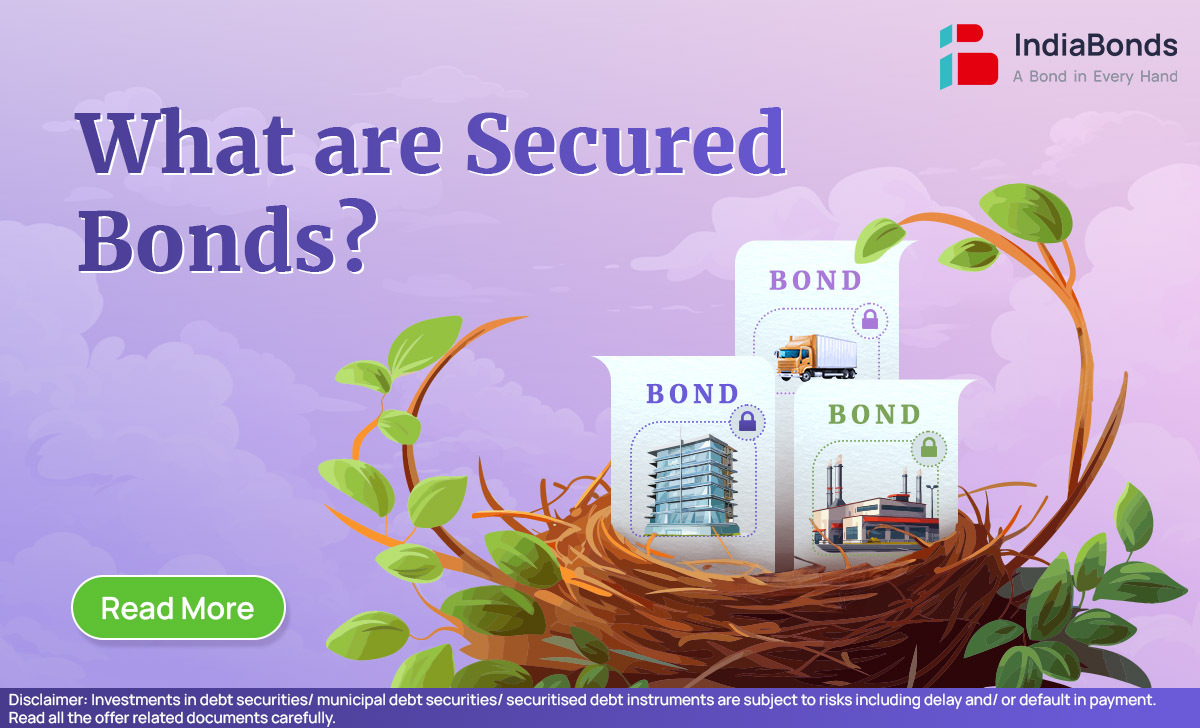What are Secured Bonds?

Introduction
Behavioral finance studies how psychological factors influence people’s decisions and behaviors in the financial markets. It recognizes that people often make irrational decisions based on emotions, biases and psychological factors. One significant bias in this context is availability bias, where decisions are based on the most easily available or memorable information rather than all relevant data.
This scenario played out vividly with the DHFL crisis in 2019. DHFL, one of India’s prominent housing finance companies defaulted on its debt obligations, including secured bonds. The media frenzy that followed was intense, and for many investors, the DHFL default became the defining image of bonds. The constant bombardment of negative news made it easy to recall, leading investors to overgeneralize the risk and shy away from bonds altogether.
While the DHFL saga certainly left a bad taste in the mouths of many investors (more on DHFL another time), it’s crucial to understand that this was a specific incident, not a reflection of the entire bond market. So, let’s shift gears and get a clear, unbiased understanding of what secured bonds really are.
What is a secured bond?
A secured bond or secured Non-Convertible Debenture (NCD) is a type of debt instrument that is backed by specific assets or collateral. This means that if the issuer defaults on the bond payments, the bondholders have a claim on the collateral, which can be sold to recover the owed amounts. This collateral can be anything from real estate, equipment, loans (for NBFCs/Banks) or other assets. The primary aim of secured bonds is to provide an added layer of security to investors, making them less risky compared to unsecured bonds.
While various manufacturing companies may use physical assets as collateral, Non-Banking Financial Companies (NBFCs) and banks often use loans as collateral. These loans, which can be either secured or unsecured, serve as the collateral for bonds issued by NBFCs and banks. When investing in NBFC or bank bonds, it is crucial to carefully scrutinize whether the loans serving as collateral are secured or unsecured.
Even though unsecured loans can be used as collateral to issue a secured bond, they inherently lack the backing of specific assets. This means that if the issuer defaults, the collateral can be used to recover the investment amount, but unsecured loans still carry inherent risks due to the absence of asset backing. Additionally, NBFCs and banks can also use receivables on loan portfolios as collateral.
How does secured bond work?
Suppose an investor named Raj decides to invest in secured bonds issued by a leading manufacturing company. This company issues bonds to raise funds for its expansion projects and backs these bonds with its portfolio of machinery and equipment.
For the investor, the secured bond offers a level of security because if the company defaults on its payments, Raj, as a bondholder, has a legal claim on the collateral to recover his investment. This collateral backing reduces the investor’s risk and provides a measure of security that the investment is protected by tangible assets.
From the company’s perspective, issuing secured bonds is also beneficial. By offering collateral, the company can attract investors more easily and can often secure lower coupon rates (interest rates) compared to unsecured bonds. This reduces the overall cost of borrowing, making it more affordable for the company to raise the necessary funds for its projects. Additionally, the company can improve its credibility and attract a broader range of investors by offering secured bonds.




Examples of Secured Bonds
Secured bonds come in many forms, depending on the type of collateral backing them. In India, corporate bonds issued by NBFCs, housing finance companies, and infrastructure firms are common examples. These are often backed by tangible assets such as property, receivables, or equipment. For instance, a power company may issue a secured bond against its future cash flows from power purchase agreements, while an NBFC might back bonds with its loan receivables. Government-backed entities like REC and PFC also issue secured bonds, offering additional comfort to investors. Such examples highlight how secured bonds combine fixed income opportunities with varying levels of risk protection.
Key Features of Secured Bonds
Secured bonds carry distinct features that set them apart from unsecured debt instruments.
First, they are backed by collateral, which provides a legal claim for investors in case the issuer defaults. This collateral can range from physical assets like land and machinery to financial receivables or future cash flows.
Second, these bonds typically offer lower yields compared to unsecured bonds, reflecting the reduced risk for investors.
Third, secured bonds are rated by credit rating agencies, and their ratings often reflect both the issuer’s financial health and the value of the collateral.
Fourth, in the event of liquidation, secured bondholders are prioritized over unsecured creditors when claims are settled.
Finally, secured bonds in India can be listed on exchanges, giving investors the option of secondary market liquidity. These features make secured bonds a relatively safer choice for conservative investors who want predictable income with protection of capital.
Advantages & disadvantages of secured bonds
Advantages
Lower Risk: The primary advantage of secured bonds is their lower risk. The collateral backing provides a safety net for investors.
Priority in Bankruptcy: In the event of the issuer’s bankruptcy, secured bondholders are given priority when it comes to repayment.
Stable Returns: Secured bonds typically offer stable and predictable returns, making them suitable for risk-averse investors.
Diversified Risk: Pooling multiple loans diversifies the risk, making the investment less vulnerable to the default of any single borrower.
Disadvantages
Lower Interest Rates: Because of the added security, secured bonds often offer lower interest rates.
Collateral Value Risk: Your cash flows might be adversely affected if the collateral loses value in the market or becomes difficult to sell during liquidation. This scenario could mean that the expected recovery from the collateral might not be sufficient to cover the investment, despite the presence of the collateral.
Secured bonds vs Unsecured bonds
| Feature | Secured Bonds | Unsecured Bonds |
| Collateral Backing | Yes | No |
| Risk Level | Lower | Relatively higher |
| Interest Rates | Moderate | Higher |
| Priority in Bankruptcy | Higher | Lower |
| Recovery Rate in Default | Higher due to collateral | Lower due to lack of collateral |
| Issuer Dependency | Asset-backed, less dependent on issuer’s reputation | Dependent on issuer’s creditworthiness |
Who Should Invest in Secured Bonds?
Secured bonds are well-suited for investors who prefer stability and capital protection over aggressive returns. Retirees and senior citizens often find them attractive since the collateral backing reduces the risk of losing their principal. Salaried professionals or business owners who want to diversify beyond equities and mutual funds can also consider secured bonds for predictable returns. Conservative investors aiming for steady income with moderate risk appetite may benefit the most. At the same time, secured bonds are also relevant for institutions and HNIs who value safety in large-ticket investments while balancing overall portfolio risk.
Risks Involved in Investing in a Secured Bond
While secured bonds reduce risk compared to unsecured instruments, they are not entirely risk-free. Credit risk still exists—if the issuer defaults, investors may face delays in recovering their money, even though collateral is available. The value of the collateral may also depreciate or become illiquid, making recovery difficult. Market risk is another factor, as the trading price of secured bonds can fluctuate with interest rate changes, affecting returns if sold before maturity. Liquidity risk is also present, especially if the bonds are not actively traded in the secondary market. Additionally, legal or procedural delays in enforcing claims on collateral may reduce the effectiveness of the security backing. Therefore, while secured bonds provide a safety net, investors must assess credit ratings, issuer quality, and market conditions before investing.
How to Invest in Secured Bonds in India?
Investing in secured bonds in India has become simpler with digital bond platforms and stockbrokers. Investors can buy them in primary issuances when companies raise fresh funds, or in the secondary market through exchanges. Online Bond Platform Providers (OBPPs), regulated by SEBI, allow retail investors to access secured bonds with transparent pricing and settlement directly in their demat accounts. The minimum investment usually starts from ₹10,000, making them accessible to a wide range of investors. Before investing, it is advisable to check the credit rating, tenure, coupon rate, and collateral backing the bond to ensure it aligns with personal financial goals.
Wrapping-Up
Before venturing into secured bonds, it’s essential to conduct thorough research and due diligence. Carefully review the issue documents such as the information memorandum, term sheet, credit rating research reports, etc. Investigate the issuer’s business, the intended use of the borrowed funds, the nature of the collateral (whether it’s appreciating or depreciating), and the credit rationale behind the rating. Even with meticulous research, there are always potential risks, including delays, defaults, and downgrades.
The old adage “do not put all your eggs in one basket” holds true. Diversify your portfolio based on your risk appetite and the return objective needed to meet your financial goals. Also, consider the tax implications of your investments. If possible, consult with a registered financial advisor for personalized guidance.
These bonds can be a valuable addition to an investor’s portfolio, especially for those seeking lower-risk investment options. The collateral backing provides a level of security that can help mitigate some of the risks associated with bond investments. However, it is crucial to conduct thorough research and due diligence to understand the specific risks and benefits of each bond. Staying informed allows investors to consider bonds as a potential asset for achieving their financial objectives.
FAQs
Q. What are senior secured bonds?
A. Senior secured bonds are bonds that are backed by collateral and have priority over other types of debt in case of the issuer’s bankruptcy. They are considered safer due to the collateral and their higher ranking in the repayment hierarchy.
Q. Is government bond a secured bond?
A. Government bonds are typically considered secure, but they are not “secured bonds” in the traditional sense because they are not backed by specific collateral. Instead, they are backed by the sovereign guarantee and taxing power of the government, making them highly reliable and safe investments.
Q. Are secured bonds a good investment?
A. Secured bonds can be a good investment for those seeking lower-risk options with stable returns. However, investors should carefully evaluate the collateral, the issuer’s financial health, and market conditions before investing.
Disclaimer: Investments in debt securities/ municipal debt securities/ securitised debt instruments are subject to risks including delay and/ or default in payment. Read all the offer related documents carefully.






















































